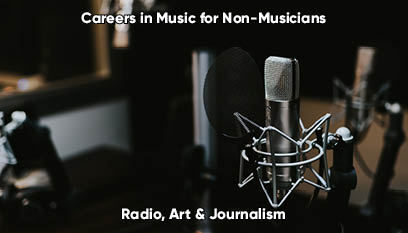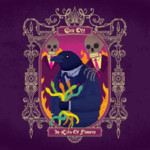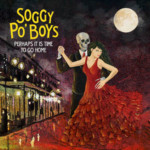
(This is Part 3 of a four-part series, Careers in Music That Do Not Involve Performing.)
For my day job I work in student activities at a public university in New England. I do a lot of the traditional things associated with this job, like advising student organizations and putting on leadership programs. But for several years, before life got too busy, I was also able to bring in a bit of my music world into my day job by running a program called Music Mentors.
The premise of Music Mentors was very simple. Over the years I had seen some student bands do better than others because they were able to make one-on-one connections with more established professionals and gain from their experience. So the program aimed to help more students establish those connections.
For each session I’d bring in a variety of folks to talk about what they do in the music world. We’d briefly share some background info on the panelists and then we’d ask the students what they were interested in. That way I knew how to moderate the conversation to make sure the students learned about what they wanted to learn about. About ⅔ of the way through, I would end the formal discussion and encourage students to talk one-on-one with the guests.
This program led to the creation of a few bands, but more importantly it led students into internships and jobs in the local scene.
So in the spirit of Music Mentors, I have prepared a four-part series about Careers in Music That Do Not Involve Performing.
- Recording Industry
- Concerts & Venues
- Radio, Art & Music Journalism
- Gear & Lessons
For this post, I spoke with professionals in radio, art, and music journalism.
RADIO HOST
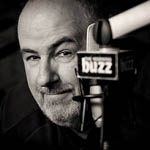
Courtesy Photo
Greg Kretschmar
Host, Greg and the Morning Buzz
Portsmouth, New Hampshire
Greg Kretschmar is the host of Greg and The Morning Buzz, heard locally on 100.3 WHEB in Portsmouth, Rock 101 in Manchester, as well as 4 other stations in NH and VT. He’s a 1984 graduate of UNH, and has been a NH resident all his life. He’s very active in giving back to the communities in NH and has helped to raise well over $1 million to help many local organizations. He’s also an avid photographer whose photography can be seen at www.kretchy.com.
SGT: What job(s) do you have (or have you done) in the world of music?
Kretschmar: Well, I work at a radio station, and have for 34 years. I was a DJ for about half of that, and now I host a talk show. The talk show, however, still deals with, talks about, and plays music as well. I got into this profession BECAUSE of music. It’s been one of the biggest loves of my life, really. I think a lot of radio folks wish they WERE musicians, hahaha. I know I do. What job could be better than playing music for a living, and being close to that industry?
SGT: How did you get started in this type of work?
Kretschmar: I got the job two weeks before I graduated from UNH. A friend who worked with me there at WUNH let me know of an opening, and I got the job the next day. He knew how much I loved music, and knew I’d bust my butt to do well at the job.
SGT: What are the important skills for someone interested in your type of work to cultivate?
Kretschmar: You have to be be able to carry on a conversation with a complete stranger, through a microphone. And you have to be able to listen, relate, and communicate with people both in the workplace and through the radio. And I would also add that you better be willing to work long hours, and work hard. Radio is a competitive industry to work in, and if you think you’re going to jump on the radio end instantly become famous, you’ve got another thing coming.
SGT: Do you have any suggestions on how someone who is interested in your type of work can get started and gain practical experience?
Kretschmar: Nowadays, most radio stations use internship programs with college students. That way the student can get experience in the real world, and can see if the job is right for them. What many think the job is and what it really is are sometimes two different things, so an internship can help with that. You can also volunteer at your local community or college radio station was well. They offer great experience and a chance to learn while you do.
SGT: What are some of the most common misconceptions about what someone in your line of work does?
Kretschmar: Most think that you work a 4-hour day, and that your day ends when your show ends. In most cases, the DJ on the air has more than just that job and has other responsibilities at the station. While there are some days you can work a 6-hr day, there are others that are 15. The other misconception is that it’s always a party. It isn’t. It’s a job. Making it sound like a party is part of the art form.
SGT: What kind of other “non-music-playing” professionals do you regularly work with?
Kretschmar: Record company execs, and management, club and venue owners, show promoters, bands and local musicians are all folks we work with on a regular basis.
SGT: Do you have anything else to add?
Kretschmar: Music is one of my favorite subjects to talk about. I love the history of it, and the fact that it’s all interconnected. As a kid, I was glued to the radio constantly. You need to know the title of a song, or band from the 60’s or 70’s? Fire away, because I’m your guy. I can’t remember what I had for breakfast today, but I can tell you that “Back When My Hair Was Short” was sung by Gunhill Road, or that Sweet’s first hit was “Little Willy.” I’m pretty good with the 80’s and 90’s too. I’ve always thought music is the shared experience that helps to bind us together. It lifts us, heals us, and soothes us in the times when we need it most.
RADIO HOST
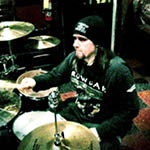
Courtesy Photo
Scott McMullen:
Host, Local Licks / The Metal Show at WHEB
Co-Host, Greg and the Morning Buzz
Portsmouth, New Hampshire
Scott “Roadkill” McMullen has been doing radio for almost 25 years now, mostly Morning Drive with Greg and The Morning Buzz on WHEB and WGIR. When he’s not doing the radio thing he’s hanging with his two teenage daughters, Nora and Sadie. He’s also played drums, keeping metal alive for almost 25 years now. His latest project, They Look Human, has a new album dropping very soon.
SGT: What job(s) do you have (or have you done) in the world of music?
McMullen: Out of the three shows I do, the morning show plays a few songs a day (unlike The Metal Lounge I host and Local Licks, which are one-hour all-music specialty shows). I play two or three songs to start the show and maybe one song later on during the show to promote an upcoming local show or maybe a interview with a performer in the band.
SGT: How did you get started in this type of work?
McMullen: Back in the day (insert time machine music), I started out as an intern at the bottom of the ladder, then moved up to being a board op (a person who stays at the station when the talent was on location playing music and commercials), then moved my way up to be part of the morning show.
SGT: What are the important skills for someone interested in your type of work to cultivate?
McMullen: You have to have people skills. Also I have learned over time to learn when to talk and when to listen. Also you have to roll with the punches and be ready for the unexpected. And be yourself!
SGT: Do you have any suggestions on how someone who is interested in your type of work can get started and gain practical experience?
McMullen: Look into local colleges, see if they have a college radio station, or go to your local radio station and ask if they are looking for people. Some of the best people I have heard lately are MCing events or announcing high school games. I did a radio show at a college and learned so much that year.
SGT: What are some of the most common misconceptions about what someone in your line of work does?
McMullen:
- “I should get into radio cause I like to talk.” Talking is only half the job.
- We all like to be the center of attention. Ahhh, no.
- Our job ends at the end of the show. Not at all — we’re always looking for topics and things to talk about.
- We don’t have a writer.
- “I love music. I should work in radio.” If a song is playing, 98% of the time we are planning the next break.
SGT: What kind of other “non-music-playing” professionals do you regularly work with?
McMullen: Our morning show interviews athletes, actors, writers, and crazy people, so it’s not just music makers.
SGT: Do you have anything else to add?
McMullen: RADIO IS ALIVE AND WELL!
MUSIC JOURNALIST
 Christopher Hislop
Christopher Hislop
Music Journalist & More
Portsmouth, New Hampshire
Hislop has been writing about music for nearly twenty years since he first arrived in the Seacoast area to attend the University of New Hampshire in 2000. At UNH, he served as the managing arts editor for The New Hampshire, where he covered the local scene as a music journalist. He is (likely) best known for his contributions to the Portsmouth Herald’s weekly EDGE Magazine, and has contributed to such publications as the Boston Phoenix, The Sound, The Square, Performer Magazine, and Forbes Magazine.
SGT: What job(s) do you have (or have you done) in the world of music?
Hislop: I’ve done quite a bit… I’ve owned a club (the Stone Church). I continue to book music. I promote events (marketing). I write articles supporting musicians/artists for local and regional periodicals. I’m involved with radio and have my own show. I sit on the board of said radio station (WSCA 106.1 FM). I’ve done work for record labels. I’ve written program copy for festivals domestic and international. I help organize the music part of a local awards show that some people care about. I’ve consulted for bands/labels/venues/festivals… I’ve had a lot of fun.
SGT: How did you get started in this type of work?
Hislop: It all started in my bedroom growing up. Listening to a broad range of different music and reading music-related magazines, back when there were A LOT of them like religious people read the Bible… This is where I started building a knowledge base back in the days before the internet when you couldn’t just Google a band name and know everything about them. From there I didn’t actively seek anything. Instead, I fell into the throes of “the gig” on accident while at the University of New Hampshire. The editor of the arts section of The New Hampshire knew I wrote and had a decent knowledge of music. I was asked to write a review of a Guided By Voices album. When I brought the article to the paper’s office (yes, I hand-delivered it…), I had the CD with me, assuming I needed to return it. They paid me, let me keep the CD, AND gave me two tickets to the band’s gig in Boston. I was hooked immediately.
SGT: What are the important skills for someone interested in your type of work to cultivate?
Hislop: Develop a network, cultivate that network, and never be afraid to open doors (potential opportunities). If you have no desire to explore and fail (at least initially), this is not the path for you.
SGT: Do you have any suggestions on how someone who is interested in your type of work can get started and gain practical experience?
Hislop: Be friendly (but not TOO friendly), be open-minded, and don’t make demands. Expect to work for free before expecting to get paid. And, even when you start getting paid, don’t shy away from the occasional freebie. There is the potential for new doors to bust down…
SGT: What are some of the most common misconceptions about what someone in your line of work does?
Hislop: There are a lot of people that think I cruise around with the band. This is not “Almost Famous.” It’s 2018. Times have changed. That said, there’s still plenty of fun to be had and life-altering experiences to be shared.
The other misconception that people have about me as it relates to my involvement with music is that I make my living based on my involvement with music. In the words of the great Dwight Schrute: “False.” I pay the bills by utilizing network and writing skills I use in my work with music in my day job, which is marketing copywriting. The pool of clients I deal with is varied and interesting, and I try to make them all look like rock stars, whether they’re selling air conditioners or surgically repairing hearts.
SGT: Do you have anything else to add?
Hislop: In terms of developing a network, I’m a pretty easy guy to chat with and am accessible. Feel free to reach out.
MUSIC JOURNALIST

Courtesy Photo
Denise Wheeler
Music Journalist & More
Portsmouth, New Hampshire
Wheeler founded the Portsmouth Herald’s weekly Spotlight Magazine. She was the arts editor with a focus on music for five years and has been a freelance author and photographer covering musicians and concerts for over two decades.
SGT: What job(s) do you have (or have you done) in the world of music?
Wheeler: I was an arts editor with a focus on music for 5 years and have been freelance writing about musicians and concerts for over two decades.
SGT: How did you get started in this type of work?
Wheeler: I majored in journalism but only applied for jobs writing features and/or magazine articles, taking any arts writing assignments I could and spinning music and art story ideas to my editors.
SGT: What are the important skills for someone interested in your type of work to cultivate?
Wheeler: The way I approached it, solid writing, reporting and editing skills were a must. I’m talking about having a handle on grammar as well as interviewing skills and cultivating storytelling chops. My background was not in music, so my way in was telling stories beyond what the casual listener or music fan knew. I wanted to enrich the enjoyment of music by providing more opportunities for fans to make connections. It was also a goal of mine to humanize the musician, to provide some intimacy in either the performer as a person or as an artist in the fluid process of creating. Listening skills are key too. In this age of journalists putting themselves in stories, I would also urge music writers to keep themselves out of the story unless there is something profound to share.
SGT: Do you have any suggestions on how someone who is interested in your type of work can get started and gain practical experience?
Wheeler: I took some low-paying or no-paying jobs to cover some gigs. Put yourself where you want to be, work diligently and respectfully, and you will get noticed.
My first full-time job stemmed from an internship. Take advantage of internships and maintain the professional relationships you make there.
Also, I am a woman in a niche that involved covering and working with a majority of men. I learned to steer away from getting romantically involved with musicians. That may sound trite, but relationships can get messy, and be made public, fast. To maintain staying power, you want it clear you can churn out unbiased stories and keep the focus on the reporting.
SGT: What are some of the most common misconceptions about what someone in your line of work does?
Wheeler: I don’t know. Do people think it’s glamorous? It’s not. At least not the blue collar, small city way I did it. But it was meaningful. It forced me to listen deeper to music and consider the craft, the passion, the motivation and the creativity that went into it. Then I got to hear and tell stories of the lives behind the music. Often that ended up strengthening the music community. Writing about a local music scene helps cement the scene and grow it. Also, I did get to dance at work occasionally. That’s a perk I valued.
SGT: What kind of other “non-music-playing” professionals do you regularly work with?
Wheeler: I do volunteer work occasionally helping put on events for charities I believe in, some of which are music fests or rock shows. I was a teenager in the ‘80s when Bob Geldof made Band Aid happen with Midge Ure. It was a star-studded event that raised money for anti-poverty efforts in Africa. Since then I’ve loved the idea of using the power of music to build community and help others.
MUSIC WRITER AND BLOGGER
 Drew Athans
Drew Athans
Author & Blogger
Indiana
Drew Athans is a husband and father of four from Dover, NH who now lives in Indiana. He has a PhD in chemistry and works as a professional scientist, but is also a huge music and sports fan. He’s a music blogger and book reviewer who has published over 125 music book reviews and two books about the band Blur. He is currently working on his first book about baseball.
SGT: What job(s) do you have (or have you done) in the world of music?
Athans: It’s not my day job (i.e. it doesn’t pay the bills…yet), but I’m a music blogger and writer. More specifically, I blog about music, I’ve written books about music, and I am a freelance reviewer of music books (mainly biographies).
SGT: How did you get started in this type of work?
Athans: This is going to be a bit long-winded, so bear with me…I figured out in my early 20s that I wasn’t ever going to make a living playing music (mainly because even though I was pretty good I wasn’t ever going to be good enough, and also I wanted to get married and have kids). Still, I’m an obsessive music fan and I love to read and write, so I decided to combine the two. I started my blog The Rock and Roll Chemist in 2011 to write about various music (and sports) topics that interest me. Along those same lines, I’ve always been a huge music collector, which includes live recordings of my favorite bands in addition to all of their albums. I’m a huge fan of the band Blur and am confident when I say I have the largest and most comprehensive collection of their live recordings in the world. I had gotten frustrated that unlike other bands I collected, there wasn’t a good book about their live music out there. One day, I decided to make a database for my own use; it grew and grew to the point that I decided to turn it into a book. I published the first edition of Black Book: The Live History of Blur in 2009 and got a great response from the fan community. I published an updated and expanded second edition in 2012 and am currently working on a third (and most likely final) edition, but I don’t have a release date set for it yet.
As far as book reviewing goes, there was a new Blur biography that was published in 2013. On a lark, I decided to contact the publisher and ask if I could have a copy to review on my site since I was well known for my two Blur books. To my surprise, they said yes! I wrote that first review and got a great response, so I decided to see if I could get other books (new and old) on other bands and musicians I was interested in. One thing led to another and now here I am five years later with over 125 book reviews under my belt. They’ve all been published on my site and I’m at the point over the last couple of years where I’ve worked with just about every major and independent publisher and I get many unsolicited requests to review new books. It’s a lot of fun and even though they’re not all winners, I always learn something from reading and writing about them.
SGT: What are the important skills for someone interested in your type of work to cultivate?
Athans: For what I’m doing, I need to be an excellent writer. My writing is something I’ve always prided myself on ever since I was a kid. My grandmother was an English teacher in Portsmouth for thirty years, so growing up I always had a gently critical set of eyes on how I spoke and wrote (two sets counting my dad, her son, who also grew up under her keen intellect). I always strive to be the best writer I can be, not only in tone and content but also my attention to grammar, spelling, vocabulary, and clarity. It drives me crazy to read anything that’s poorly written no matter the subject and in the last few years I’ve seen far too many people who try to write yet have a poor grasp of the basics. I’m not trying to sound elitist, but from personal experience I’ll say that no matter how good what you’re saying is, if it’s poorly written it’s an immediate turn-off for me and countless others. So if you want to be a writer, you need to write often (it takes practicing just like anything else), study, and perfect your craft.
SGT: Do you have any suggestions on how someone who is interested in your type of work can get started and gain practical experience?
Athans: If you want to be a writer, you need to write. A lot! Just like anything else, it takes a lot of practice and learning to master it. I would suggest studying the writers you like and paying attention to what it is you actually enjoy about them. Try to incorporate that into your own writing but make sure to define your own voice in order to carve out your personal style. Also, don’t be afraid of criticism or failure; rather, learn from it to make your writing even better.
SGT: What are some of the most common misconceptions about what someone in your line of work does?
Athans: That we make a lot of money! Some bloggers and writers earn a living doing what they do, but it’s very difficult to get to that point and takes a lot of luck in addition to skill. Most of us do it as a labor of love; that’s certainly my case. I do earn some money from what I do (not a lot and certainly not enough to allow me to make a career change), but that’s not the prime reason why I do it. I mainly get paid in free books and the satisfaction of people enjoying my work as I share my love of music.
SGT: What kind of other “non-music-playing” professionals do you regularly work with?
Athans: I mainly work with other writers, publishers, and music fans.
SGT: Do you have anything else to add?
Athans: It may seem like a bit of an unorthodox “music” career, but it’s been a ton of fun and really fulfilling to be a music writer and reviewer. It’s opened up a lot of new doors and opportunities and I’ve met a lot of very cool and interesting people along the way (including a lot of musicians, managers, and peripheral figures who I’ve read about!).

Courtesy Photo
GRAPHIC DESIGNER/ ILLUSTRATOR

Courtesy Photo
Matt Talbot
New Hampshire
Matt Talbot is a designer and illustrator from the New Hampshire Seacoast. He works at Brown & Company Design in Portsmouth by day and stays busy with lots of poster and illustration work at night. Find him online at mattrobot.com.
SGT: What job(s) do you have (or have you done) in the world of music?
Talbot: I design album covers and gig posters for various bands.
SGT: How did you get started in this type of work?
Talbot: As a designer with a very strong interest in music, I initially approached local bands, or friends in bands. Or, friends in bands reached out to me. It was a kind of design work that I really wanted to do, so I tried really hard to make it happen.
SGT: What are the important skills for someone interested in your type of work to cultivate?
Talbot: It probably helps to go to design school, although I didn’t. It’s possible to train yourself, although software skills can be a little harder to acquire. Really, just like with playing music, there’s no real trick other than spending a ton of time practicing and improving your craft.
SGT: Do you have any suggestions on how someone who is interested in your type of work can get started and gain practical experience?
Talbot: If you have an interest in doing this kind of work, there’s no one telling you that you can’t just dive in. Do fan art for your favorite bands. Approach your friends’ bands about making a flyer. Or just make the flyer! Draw. Paint. Take photos. Design. Just do it. If you need software experience, YouTube has a ton of tutorials. Your portfolio is what will ultimately land you a gig. If you go to school, you’ll develop one. If you don’t, it’s up to you to make it happen any way you can.
SGT: What are some of the most common misconceptions about what someone in your line of work does?
Talbot: I would say that it’s unadulterated fun, or filled with unfettered creative opportunities. Because people only see the final product, there’s not a sense of how much work goes into it. It can be fun, for sure. But I’ve found that working with musicians, especially on album covers, is often challenging because they have so much personally invested in the creative work. Be prepared to be highly collaborative, and to take feedback professionally and not personally.
SGT: What kind of other “non-music-playing” professionals do you regularly work with?
Talbot: I design a lot of stuff for a huge range of clients in lots of different industries. Music-related projects are a small part of what I do. So this one is a little tough to answer, but I really work with pretty much anyone. As an aside, I work with a lot of musicians who are also web developers! It’s an interesting crossover. Nearly every web developer I’ve worked with also plays music.
GRAPHIC ART/ SCREEN-PRINTING

Courtesy Photo
Cole Gove
T-Shirt Beardo
Dover, New Hampshire
As a musician Cole Gove has performed in over 36 states, had his music played on radio stations nationwide, and has recorded with a Grammy-nominated artist. Cole helps organize farmers’ markets and runs a small independent screen-printing shop called T-shirt Beardo. In his spare time Cole likes to tinker with old motorcycles and take photos, and is currently attempting to creating the ultimate Tinder profile.
SGT: What job(s) do you have (or have you done) in the world of music?
Gove: I am a graphic artist and a screen-printer who creates promotional items for musicians’ posters, banners, and Tshirts. I have also run a small recording studio with my good friend Jesse Dold.
SGT: How did you get started in this type of work?
Gove: I had my own band and was making posters for our shows. Started researching classic rock posters and realized that many of them were screen-printed. From there I fell in love with the medium. Over time it grew into a small business.
SGT: What are the important skills for someone interested in your type of work to cultivate?
Gove: Patience, determination, and a desire to learn.
SGT: Do you have any suggestions on how someone who is interested in your type of work can get started and gain practical experience?
Gove: Realize that it takes time to grow. Start doing it for fun and share your end results with folks. Take on small projects that interest you and deliver a product. Learn from your mistakes. Try to improve over time and keep at it. Reach out to your peers who are on similar paths. Be supportive and share what you have learned freely with them. Always be learning more about your craft.
SGT: What are some of the most common misconceptions about what someone in your line of work does?
Gove: That it is automated. I am printing each item by hand.
SGT: What kind of other “non-music-playing” professionals do you regularly work with?
Gove: Farms, hair salons, restaurants, and clothing lines.
SGT: Do you have anything else to add?
Gove: “If one advances confidently in the direction of his dreams, and endeavors to live the life which he has imagined, he will meet with a success unexpected in common hours.” Henry David Thoreau
Don’t forget to check out the other posts in this series!
Careers in Music That Do Not Involve Performing:

